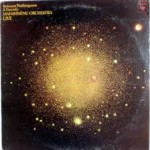The Nobel prize for Physics has just been awarded to Adam Riess and two  other astrophysicists for proof that the universe is not only expanding, but that this is accelerating, i.e. the universe is expanding faster and faster as time goes on. The most likely reason: a mysterious cosmic force known as dark energy.
other astrophysicists for proof that the universe is not only expanding, but that this is accelerating, i.e. the universe is expanding faster and faster as time goes on. The most likely reason: a mysterious cosmic force known as dark energy.
I’m not going to concern myself at the moment with what “dark energy” is (or even – to paraphrase Bill Clinton about another type of energy – that it depends on what “is” is).
What interests me is where the universe is expanding into. Does it not imply that there is something outside the universe for the universe to expand into? After all, it must be expanding into something. Or is it expanding into nothing?
If there is something outside the universe, then that should be part of the universe. Is there something I’m not getting here?
So let’s look at the possibility that the universe is expanding into nothing. But if nothing is Nothing (the absence of everything), then the mind boggles at a universe expanding into it. It? I can’t even say that it depends upon what “it” is; I don’t care what “it” is. “It” is something. Always. “It” can’t be Nothing.
OK, so let’s say that nothing is not Nothing, but that it is nothingness (the absence of something). But if we do that, then we are back to the problem of the universe having something outside it. After all, nothingness is something. (Read the book if you’ve lost me).
We are now in a real quandary – as opposed to the small quandary at the start of this message: The universe cannot expand into Nothing, even though that is the only – ooops, I almost wrote “thing” – possibility. But of course it isn’t a possibility, since Nothing cannot be expanded into.
There is, of course, no way out of this conundrum, since positing that the universe is expanding into Nothing would mean that Nothing becomes something. And we all know – apart from believers in God and in Quantum mechanics (and I’m going to get more attacks for that from followers of the latter than of the former), that that is impossible.
So while I have the utmost respect for Riess and his colleagues, I am left scratching my head. I presume they have an answer to my questions, and I also feel that I wouldn’t understand it.
But if they do explain it, perhaps they deserve a second Nobel Prize: for showing how something can be created from nothing. It’s supposedly only been done once before.

We think that the universe is expanding into something, or into nothing, because we are here and it is there. Our concept of time and space are so limited, that we cannot see the whole, but only the parts. So the universe may not be expanding at all, but rather only our point of reference. If we could see beyond the walls and corners of our existence, we might be able to see at once all that which appears to be slowly unfolding before our eyes. Does this mean that all is something, or all is nothing?
The word universe is our definition based on our best guesses and information available from the technology at hand. Surely, you do not believe that we can fathom the depths of time and space, that we know what the borders of the universe are. There is so much more for the human race to learn. This revelation is a bit like the early explorers sailing to parts of the world unknown to discover what is lies beyond the known.
Gitte, I agree that our knowledge is not necessarily “true”, but is based on, and limited by, our capacity as humans. But on the other hand, you state that we are like early explorers, the implication being that we will, at some point, find out what is out there and what it all means.
As for the first part, I do make reference to it in the last chapter of my book, in which I discuss the proposition that humans are simply not capable of understanding something, a position called “Mysterianism”. I show a problem here, and if I may quote: “The claim that some problems are incapable of being solved contains its own destructive weakness, for it means that humans have been built in some way that we will never be able to understand some fundamental problems. The paradox here, as pointed out by Nicholas Fearn, is that we would not know if we are capable of knowing enough about an issue until we know something about it. How far along we would need to go in order to come to a conclusion, is what makes the paradox deliciously crazy.” (Nothing Matters, p. 248).
David, I think you have a good point. We cannot see beyond what we can see, and so can only discuss matters within those limits. That does not, of course, mean that we should stop searching for what is beyond the horizon.
As for your question about something and nothing, I can but say that all cannot be nothing. All is, whereas nothing is not.